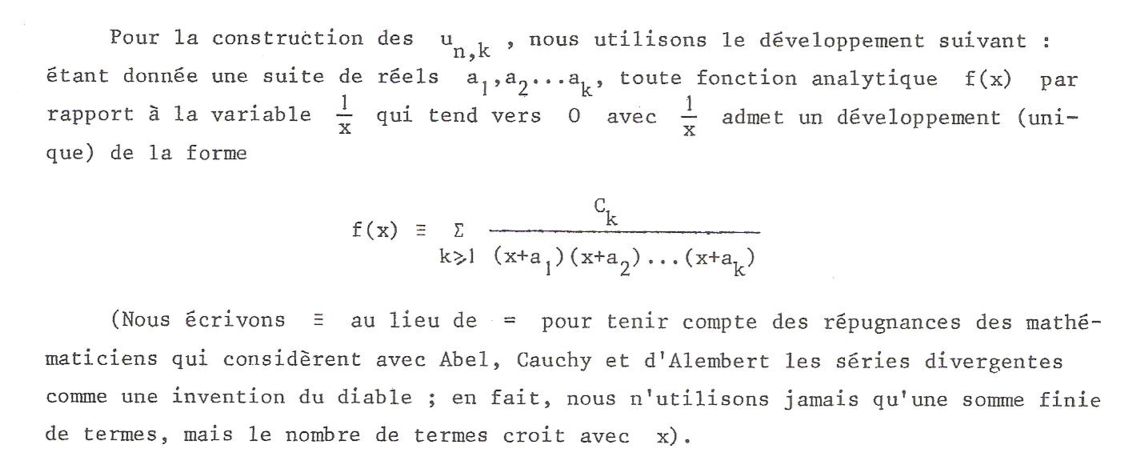UPDATE. I am now making this a CW in the hope someone can improve the content of this question and/or correct the text.
This is a concise version of this math.SE question of mine. I've got an answer but it is not clear to me whether the explanation that was provided is enough.
My apologies if the level of this question, which is my first one here, does not comply with the rules of this site.
The question is:
In Apéry, R., Irrationalité de $\zeta 2$ et $\zeta 3$, Société Mathématique de France, Astérisque 61 (1979) there is a divergent series expansion for a function I would like to understand.
Added copy of the original.

Here is my translation of the relevant part for this question
(...) given a real sequence $a_{1},a_{2},\ldots ,a_{k}$, an analytic function $f\left( x\right) $ with respect to the variable $\frac{1}{x}$ tending to $0$ with $\frac{1}{x}$ admits a (unique) expansion in the form $$f\left( x\right) \equiv \sum_{k\geq 1}\frac{c_{k}}{\left( x+a_{1}\right) \left( x+a_{2}\right) \ldots \left( x+a_{k}\right) },\tag{A}$$
[Edit] and a translation of the text after the formula (provided in a comment on math.SE)
(We write $\equiv$ instead of $=$ to take into account the aversions of mathematicians who, following Abel, Cauchy and d'Alembert, hold divergent series to be an invention of the devil; in fact, we only ever use a finite sum of terms, but the number of terms is an unbounded function of $x$).
As far as I understand, expansion of $f(x)$ in $(\mathrm{A})$ is in general a divergent series and not a convergent one.
Questions
- Is series $(\mathrm{A})$ indeed divergent? (question added)
- Which is the theorem stating or from which $(\mathrm{A})$ can be derived?
- Could you please indicate a reference?
ADDED. The most similar formula which is proved in Alf van der Poorten's article A proof that Euler missed ... Apéry's proof of the irrationality of $\zeta (3)$ is this one in section 3
$$\sum_{k=1}^{K}\frac{a_{1}a_{2}\cdots a_{k-1}}{(x+a_{1})\cdots (x+a_{k})}= \frac{1}{x}-\frac{a_{1}a_{2}\cdots a_{K}}{(x+a_{1})\cdots (x+a_{K})}.\tag{B}$$
Further edit. This article by Alf van der Poorten, which was indicated in Micah Milinovich's answer, had been pointed to in my original math.SE question. The author wrote in it that "the proof of $(\mathrm{B})$ follows easily on writing the right-hand side as $A_0 - A_K$ and noting that each term on the left is $A_{k-1} - A_k$. This explains [the following claim corresponding to $f(x)=1/x$]"
$$\sum_{k=1}^{\infty}\frac{a_{1}a_{2}\cdots a_{k-1}}{(x+a_{1})\cdots (x+a_{k})}= \frac{1}{x}.\tag{*}$$
How to explain $(\mathrm{A})$ in the case when $f(x)$ is a general analytic function with respect to the variable $1/x$ which goes to $0$ with $1/x$?
Added. MOTIVATION. After reading in detail Alf van der Poorten's article I read the very short Roger Apéry's paper. I am interested in finding a proof of the series expansion in the latter, which is in not given in it. So I assumed it should be stated or derived from a theorem on the subject.
